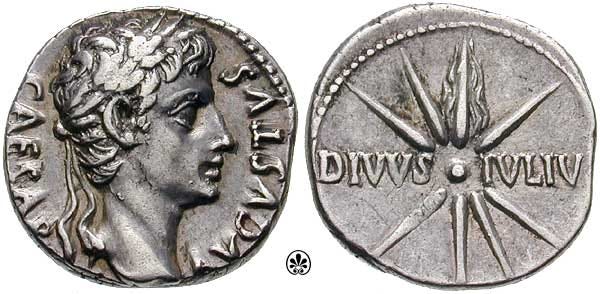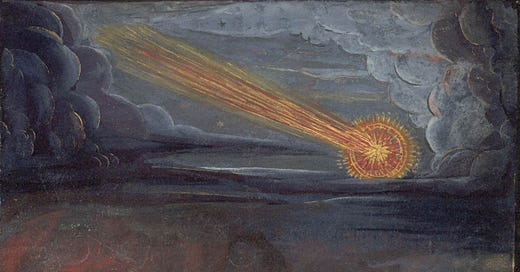The first poem is a triolet I wrote for J. Tullius’ New Year’s Contest. I thought I’d share it here, as it bears some relevance to the rest of the post.
Caesar Divi
His star was flashing in the sky,
and no one, then, had found it odd.
We saw it on the day he died,
his star was flashing in the sky.
He sits upon a throne most high.
Render unto Caesar what is God.
His star was flashing in the sky,
and no one, then, had found it odd.If you’re interested in triolets, I’d encourage you to check out D.A. Bishop who recently published a post about the form and his thoughts on it.
The summer that Caesar was murdered, a comet was seen in the sky for seven days. It was popularly thought to be the soul of Caesar on its way to join the gods. It would figure heavily in the push to deify the man, which the Senate at first resisted, but eventually consented to by 42 BC.
Thus, a religion of Caesar was formed, one whose authority would be called upon frequently by successive Caesars who claimed omens similar to the “Julian Star.” Fortuitous births, conspicuous deaths. The Emperor Vespasian (AD 69-79) was said to have cured a blind man by spitting on him, and made a lame man walk by his touch alone. The tales no doubt circulated in part to legitimize Vespasian’s rule after a tumultuous civil war that saw four different emperors in a single year.
The Imperial Cult became a powerful political tool, as indeed many of the established religions were. The temples and shrines, which dominated public spaces, functioned not only as places of worship, but also hubs for canvasing and organizing. The temple of Castor and Pollux was the scene of a political riot that saw Cato and Cicero narrowly escape violence. Mystery cults, too, like those of Isis and Cybele, were, according to historian Guy de la Bédoyère, “associated with collegiate organizations which in the eyes of the Roman authorities were more or less synonymous with dangerous political organizations bent on subverting the state.”1
For the Romans, religion was “primarily transactional and contractual.” Their superstition was pragmatic in nature. They threw salt over the shoulders “just in case” not doing so might impact them adversely.
The word delubrum (‘shrine’) meant ‘[the place] of expiation’, or in other words where actions or other mechanisms could be used to avert or avoid something.2
Nor was Rome picky about what it worshipped. The mystery cult of the Magna Mater was incorporated into Rome in order to save the city from its imminent defeat by Carthage in 213 BC. Another pragmatic act meant to expiate whatever sins had brought the scourge of Hannibal upon them at that time. And it worked. Thus, they welcomed any religion that might benefit them, and tolerated many more just in case. It was joked that, upon conquering a foreign foe, they would rush into the temples there and praise whatever god they had just overcome. Toleration and incorporation were keys to their growth as an empire.
It was this attitude toward religion that allowed the Cult of Caesar to gain a foothold within the state. However, while it was acceptable to worship a dead Caesar, it was taboo at the beginning of the Empire to worship a live one. Augustus, although he adopted the title divus filius, “son of a god,” was careful to distance himself from the claim of being a god himself, which the presence of the new religion might have suggested.3 When the people of Bithynia desired to worship Augustus as a savior, the princeps suggested they make offerings instead to dea Roma, the Goddess Rome herself.

As time went on, however, the distinction between the Caesar of the religion and the Caesar of the state became blurred, until, by the time of Diocletian (284-305 AD) men were being made to swear loyalty oaths to the Imperial Cult. They were asked to throw incense onto the altar of Caesar and declare him Dominus et Deus. This was a tactic used to sniff out Christians who were being persecuted at the time under the emperor. But if anyone failed to do this, Christian or not, they would not be granted a libellus, which was a license needed to buy and sell in the markets. Indeed, by the time time Constantine moved the capital and declared himself a Christian, the Roman Empire was a thoroughly monarchic-deistic one, with Caesar serving as both head of state and godhead, for all practical purposes.
The second poem is a sonnet on the first priest of the Cult of Caesar: Mark Antony. Antony was given the position of flamen of the divus Julius in 40 BC, although the appointment was to be short-lived, as nine years later the reincarnation of Caesar would defeat him at the battle of Actium and chase him back to Egypt, where he would capitulate to the demands of the new god, and fall on his sword.
The Cult of Caesar
The first priest of the God Caesar was Antony.
In his cloak and miter, with his ornate sceptre,
he looked ridiculous. His good looks and charm
were not for the abstruse gestures of religious rites.
But he was nothing if not a worshipper. In Egypt
he castrates himself and joins the cult of Cleopatra,
to drink up the Nile and sweat beneath the palms.
Caesar is angry. A jealous, vindictive God, he says
Thou shalt have no other gods before me, and smites
Antony, and makes his queen track the blood
from marbled hall to hall until she finds him
on a rug, curled in a ball. “Your old gods are dead,”
he gasps, choking on the gall. She dreads the thought,
tears the brooches from her dress, and clutches the asp.Thank you for reading
Some other poems in the series so far:
“The Ritual Sacrifice of Caesar” - On Caesar’s assassination
“Caesar Ultor” - Caesar takes bloody revenge for his murder
“Caesar Triumphator” - As a god, ruminating on the order he’s created
“Capo the Aquari” - On getting by in the Empire
“The Sibyl Hands Superbus the Books” - The voice of the Sibyl casts a warning
“SPQR” - on the bodies of the State
“Civitas” - On the sentiments of the optimates and the populares
“Vixerunt” - On the fate of the Catiline conspirators
“The Coming of Caesar” - Heroic, galloping dactyls on the omens foreboding Caesar
“Populus” - On Caesar’s political victory over Cato
“Res Publica” - On the decay of the State
“Veni Vidi Vici” - On Caesar’s 10+ years of military ascension
Populus. University of Chicago Press. p 322.
ibid. p 305.
Although in private he seemed to desire it.






Quite enjoyed the triolet, Robert. The refrains were well-chosen and the writing as always was top-notch.
It seems Romans had much in common with the Vikings in terms of viewing religion as transactional, along with their willingness to try whatever might provide them with the results they sought. I wonder how many of us might have a touch of that ourselves.
Some great insight added here. What do you think—did I overtax your poem with my reading?